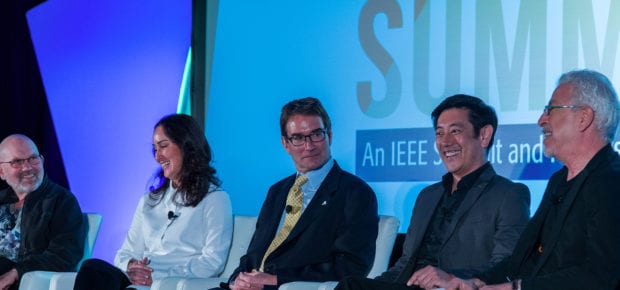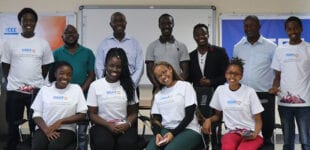June 1, 2018
The second annual IEEE Vision, Innovation, and Challenges Summit and Honors Ceremony took place on 11 May 2018 at the Palace Hotel in San Francisco, California, USA. The action-packed event brought together dozens of leading innovators, visionaries, and disruptors in technology to discuss, explore, and uncover what is imminent and what is possible—and what emerging technologies mean for our future. The Summit included fireside chats, interactive panels, and live demos and culminated with festivities that included the celebration of the contributions of the greatest minds of our time who have made a lasting impact on society for the benefit of humanity. The event kicked off with opening remarks from the 2018 IEEE President, Jim Jefferies, and the program was led by its Master of Ceremonies, Brent Lunceford.
A gathering of this magnitude, along with an excellent program, made the Summit successful. Its lineup of esteemed speakers and moderators provided the audience with plenty to discuss, starting with the keynote address by Todd Richmond, Director, Mixed Reality Lab/Studio, USC on the topic “New Immersive Mediums—The Search for Egg Yolk.” In his address, Todd shared various insights through the description of three new mediums (currently in use) in the 21st century: Internet, smartphones, and AR/VR. He noted the fourth as “AI and machine learning,” which he stated will be a new communication medium. Another fascinating outlook shared by Richmond was about the emerging disruptive technologies tied to AR/VR/MR and their applications. In his closing remarks, Richmond noted that fake news is going to become even more of an issue with the convergence of artificial intelligence and VR technologies. He concluded with advice about how NOT to innovate: avoiding risk, fear, and failure. Instead, seek comfort in focusing on an outcome. Always try to be creative and innovation will come.
Mark Meyer, from Pixar Research Group, spoke about “Geometry Processing & Animated Film” and took the audience back to physics class with explanations on how it is applied in movies. He described how physical simulation at Pixar brought Princess Merida’s character to life in the Pixar movie Brave, for example. The audience was speechless upon seeing how each character comes into existence based on the technology used for deep learning rendering. Another mind-blowing segment was the panel on “The New Gene Therapy: CRISPR-Cas9 and the Future of Medicine,” moderated by the IEEE Spectrum Executive Editor Glenn Zorpette, with panelists John Tisdale, NIH, and Bruce Conklin, UCSF. The conversation on genome editing sparked an interesting discussion, especially about finding the cure for diseases.
Following the The New Gene Therapy session came the star-studded panel discussion “Robots on the Rise: The Future of Robotics and AI,” moderated by Stanford University Professor, Oussama Khatib, with panelists Cynthia Breazeal, Associate Prof. at MIT & Founder and Chief Scientist of Jibo, Inc.; Eric Krotkov, COO at TRI; Marc Raibert, Founder and CEO of Boston Dynamics; and Grant Imahara, Consulting Mechanical Designer, Disney Research and Host, Discovery Channel’s MythBusters. During the discussion, Raibert explained that Boston Dynamics is working on making robots using mostly 3D printed parts or having 3D printing in mind. He then introduced SpotMini, who took a stroll through the audience. Breazeal explained that Social robotics was a new type of platform that could bring all this content to life and encourage humanistic engagement. Click here to read more coverage.
The final panel for the Summit focused on “Social Impact, and the Role of Engineers in Today’s Society,” moderated by Matthew Fiedler, re:3D, with panelists Ryan Cousins, CEO, krtkl, inc.; Kevin Noertker, Co-Founder and CEO, Ampaire; and Veronica Osinski, Founder and Managing Partner, Trifecta Capital. The key takeaway from this panel was that our world would not be what it is today if it wasn’t for the work of all engineers across the globe.
The IEEE VIC Summit came to a close with the prestigious Honors Ceremony where 25 recipients were honored, including Life Fellow Bradford W. Parkinson, who received IEEE’s highest recognition, the Medal of Honor, for his role in leading the development and advancement of GPS.





 Meaningful Momentum or Running in Place?
Meaningful Momentum or Running in Place? AI Through Our Ages
AI Through Our Ages Liquid Infrastructure: Our Planet's Most Precious Resource
Liquid Infrastructure: Our Planet's Most Precious Resource The Impact of Technology in 2025
The Impact of Technology in 2025 Quantum and AI: Safeguards or Threats to Cybersecurity?
Quantum and AI: Safeguards or Threats to Cybersecurity? Why AI Can't Live Without Us
Why AI Can't Live Without Us Bits, Bytes, Buildings and Bridges: Digital-Driven Infrastructure
Bits, Bytes, Buildings and Bridges: Digital-Driven Infrastructure Impact of Technology in 2024
Impact of Technology in 2024 Emerging AI Cybersecurity Challenges and Solutions
Emerging AI Cybersecurity Challenges and Solutions The Skies are Unlimited
The Skies are Unlimited Smart Cities 2030: How Tech is Reshaping Urbanscapes
Smart Cities 2030: How Tech is Reshaping Urbanscapes Impact of Technology 2023
Impact of Technology 2023 Cybersecurity for Life-Changing Innovations
Cybersecurity for Life-Changing Innovations Smarter Wearables Healthier Life
Smarter Wearables Healthier Life Infrastructure In Motion
Infrastructure In Motion The Impact of Tech in 2022 and Beyond
The Impact of Tech in 2022 and Beyond Cybersecurity, Technology and Protecting Our World
Cybersecurity, Technology and Protecting Our World How Technology Helps us Understand Our Health and Wellness
How Technology Helps us Understand Our Health and Wellness The Resilience of Humanity
The Resilience of Humanity Harnessing and Sustaining our Natural Resources
Harnessing and Sustaining our Natural Resources Creating Healthy Spaces Through Technology
Creating Healthy Spaces Through Technology Exceptional Infrastructure Challenges, Technology and Humanity
Exceptional Infrastructure Challenges, Technology and Humanity The Global Impact of IEEE's 802 Standards
The Global Impact of IEEE's 802 Standards Scenes of our Cyber Lives: The Security Threats and Technology Solutions Protecting Us
Scenes of our Cyber Lives: The Security Threats and Technology Solutions Protecting Us How Millennial Parents are Embracing Health and Wellness Technologies for Their Generation Alpha Kids
How Millennial Parents are Embracing Health and Wellness Technologies for Their Generation Alpha Kids Space Exploration, Technology and Our Lives
Space Exploration, Technology and Our Lives Global Innovation and the Environment
Global Innovation and the Environment How Technology, Privacy and Security are Changing Each Other (And Us)
How Technology, Privacy and Security are Changing Each Other (And Us) Find us in booth 31506, LVCC South Hall 3 and experience the Technology Moon Walk
Find us in booth 31506, LVCC South Hall 3 and experience the Technology Moon Walk Virtual and Mixed Reality
Virtual and Mixed Reality How Robots are Improving our Health
How Robots are Improving our Health IEEE Experts and the Robots They are Teaching
IEEE Experts and the Robots They are Teaching See how millennial parents around the world see AI impacting the lives of their tech-infused offspring
See how millennial parents around the world see AI impacting the lives of their tech-infused offspring Take the journey from farm to table and learn how IoT will help us reach the rising demand for food production
Take the journey from farm to table and learn how IoT will help us reach the rising demand for food production Watch technical experts discuss the latest cyber threats
Watch technical experts discuss the latest cyber threats Explore how researchers, teachers, explorers, healthcare and medical professionals use immersive technologies
Explore how researchers, teachers, explorers, healthcare and medical professionals use immersive technologies Follow the timeline to see how Generation AI will be impacted by technology
Follow the timeline to see how Generation AI will be impacted by technology Learn how your IoT data can be used by experiencing a day in a connected life
Learn how your IoT data can be used by experiencing a day in a connected life Listen to technical experts discuss the biggest security threats today
Listen to technical experts discuss the biggest security threats today See how tech has influenced and evolved with the Games
See how tech has influenced and evolved with the Games Enter our virtual home to explore the IoT (Internet of Things) technologies
Enter our virtual home to explore the IoT (Internet of Things) technologies Explore an interactive map showcasing exciting innovations in robotics
Explore an interactive map showcasing exciting innovations in robotics Interactively explore A.I. in recent Hollywood movies
Interactively explore A.I. in recent Hollywood movies Get immersed in technologies that will improve patients' lives
Get immersed in technologies that will improve patients' lives